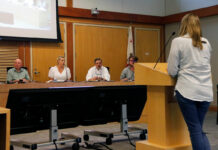“All who believed were together and had all things in common. They would sell their possessions and goods and distribute the proceeds to all, as any had need…”
I realize that to a majority of the members of Congress these words must sound like some kind of dangerous, Marxist, left wing, utopian daydream. But in fact, these words come from the New Testament Book of Acts, and are a description of daily life in the very first Christian community in Jerusalem.
Imagine that. In the first church, those who had more were actually sharing with those who had less in order to make sure that everyone had enough. Whatever happened to that early Christian spirit of sacrifice and concern for the common good? “I’ll take a little less so that you can have enough.” Do such words even make sense to us anymore?
In May, one of my favorite journals, The Christian Century, had a column about the sequester. Do you recall the sequester? It stands as one of the greatest examples of total government dysfunction in my memory.
The across-the-board sequester cuts were designed to force legislators to reach a budget agreement they could not manage to achieve on their own. Most of those in Congress were against the sequester and its drastic cuts, but now that we have it they have been unable to find a way to reverse it.
Now one could argue that at least the cuts are being spread among a wide range of programs — that the sacrifice is being equally shared. But is that true? In the words of the Christian Century editorial, “Recent weeks have shown that Congress is actually quite capable of getting things done if the bill in question is a narrow one that directly affects legislators’ primary demographic — people with a lot of money.”
Consider: Shortly after the sequester took effect, Congress reversed its furloughs for meat safety inspectors without whom meatpacking plants are not able to operate. Then in April, facing an outcry from air travelers over the potential for delayed or cancelled flights, Congress eliminated furloughs for air traffic controllers. Hallelujah! There will be no gap in the supply of steaks and business travelers will not have to tolerate delays in airports.
But wait. Did you know that when Congress restored the U.S. Department of Agriculture’s funding for furloughed inspectors, it paid for that funding by removing money from the school breakfast program that subsidizes meals for low-income students, a program which the USDA also administers?
Let’s see … meat industry — lots of money; poor kids — not so much. Cleary the powerful meat industry lobby holds far more sway over Congress than the needs of hungry kids.
So who really is feeling the effects of the sequester? It threatens to strip 113,000 low-income families of their public housing vouchers. Head Start anticipates dropping 70,000 kids. Meals on Wheels expects to serve 4 million fewer meals this year. It is clear that when the sequester can be scaled back on a case by case basis, favoring the interests of powerful and well-heeled business interests and individuals, the burden of cuts is shifted to those who have already made more then their share of sacrifices.
What would happen, asked the editorial, if Congress chose instead to bundle repeals of cuts that affect the rich and powerful with repeals of cuts that focus on the poor and less powerful, refusing to support one without the other? Sharing with all who have need.
My goodness, it is a biblical idea so old that it actually sounds radically new.
Gene Nelson is pastor of the Community Church of Sebastopol.








